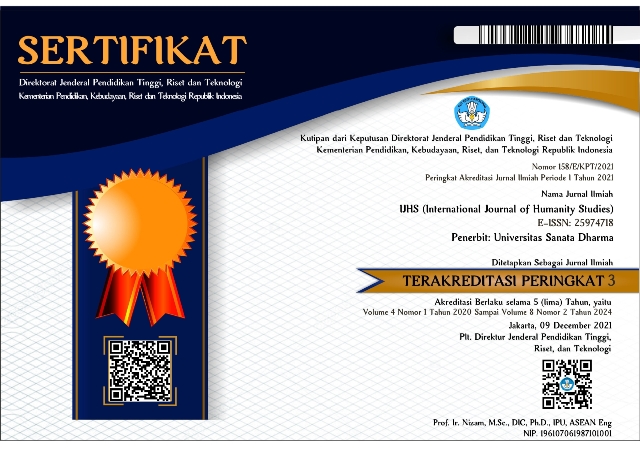MULTICULTURAL EDUCATION AS SEEN IN FORREST CARTERS THE EDUCATION OF LITTLE TREE
Abstract
Keywords
Full Text:
PDFReferences
Banks, J. A. (1997). Multicultural education: Theory and practice (6th ed.). Boston: Allyn and Bacon.
Baker, C. (2004). The SAGE dictionary of cultural studies. London: SAGE Publications Ltd.
Barrett, C. A. (2003). Indian civil rights act. In Carole A. Barrett (Ed.), American Indian history (pp. 193-196). Pasadena, CA: Salem Press Inc.
Cannon, Byron D. (2003). Indian-white relations: U.S., 1934-2002. In Carole A. Barrett (Ed.), American Indian history (pp. 292-300). Pasadena, CA: Salem Press Inc.
Creswell, J. W. (2003). Research design: Qualitative, quantitative and mixed methods approaches (2nd ed.). California: Sage Publications, Inc.
Engan-Barker, D. (2004). Education: Post-contact. In Carole A. Barrett and Harvey J. Markovitz (Eds.), American Indian culture (pp. 245-254). Pasadena, CA: Salem Press Inc.
Feinberg, W. (1996). The goals of multicultural education: A critical re-evaluation. New York: Philosophy of Education.
Maddox, L. (1999). Locating American studies: The evolution of a discipline. Baltimore and London: The John Hopkins University Press.
Merideth, R. (1968). Theory, method and American studies. In Robert Merideth (Ed.), From American studies (pp. 88-124). Columbus, OH: Charles E. Merill.
Palmer, D. J. (1987) Historicism. In Roger Fowler (Ed.), A dictionary of modern critical terms (pp. 121-134). New York: Routledge & Kegan Paul.
Pritzker, B. M. 1998). Native Americans: An encyclopedia of history, culture, and peoples. Santa Barbara, CA: ABC-CLIO Inc.
Selden et al. (2005). A readers guide to contemporary literary theory (5th ed.). Edinburg Gate: Pearson Education Limited.
Swartz, E. (1992). Multicultural education: From a compensatory to a scholarly foundation. In Carl A. Grant (Ed.), Research & multicultural education: from the margins to the mainstream (pp. 31-42). Washington D.C.: The Falmer Press.
Tischauser, L.V. (2003). Reservation system of the united states. In Carole A. Barrett (Ed.), American Indian history (pp. 478-484). Pasadena, CA: Salem Press Inc.
DOI: https://doi.org/10.24071/ijhs.v1i1.670
Article Metrics
Abstract view : 2180 timesPDF view: 1057 times
Refbacks
- There are currently no refbacks.
Copyright (c) 2017 Ignatius Indra Kristianto
Indexed and abstracted in:
IJHS Sinta 3 Certificate (S3 = Level 3)
International Journal of Humanity Studies (IJHS) has been nationally accredited Sinta 3 by the Ministry of Education, Culture, Research and Technology of the Republic of Indonesia based on the decree No. Surat Keputusan 158/E/KPT/2021. Validity for 5 years: Vol 4 No 1, 2020 till Vol 8 No 2, 2024

This work is licensed under CC BY-SA.
Creative Commons Attribution-ShareAlike 4.0 International License.
p-ISSN: 2597-470X (since 31 August 2017); e-ISSN: 2597-4718 (since 31 August 2017)
International Journal of Humanity Studies (IJHS) is a scientific journal in English published twice a year, namely in September and March, by Sanata Dharma University, Yogyakarta, Indonesia.
Note: The opinions expressed in this publication are those of the authors. They do not purport to reflect the opinions or views of the editorial team or publishers.

















